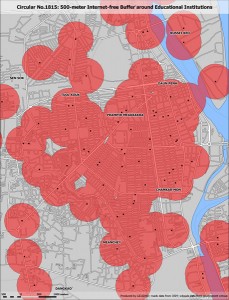Source: Global Voices Online
Kounila Keo
Cambodia’s Ministry of Post and Telecommunications has issued a circular banning internet cafes within 500 meters of schools or educational buildings. The circular also prohibits internet cafes from welcoming young people under the age of 18, pointing that internet poses numerous dangers such as terrorism, economic crimes and the distribution of pornography, as the Cambodia Daily newspaper reported.
This circular came a few months after the government enforced a previous circular that required internet cafes to set up surveillance cameras and register callers.

The internet-free zones would lead to the closure of almost all internet cafe shops in Phnom Penh. Mapping by Licadho
This has raised a lot of eyebrows among Cambodian bloggers. Tharum Bun wrote on the VOA blogthat the new government would eventually eliminate Phnom Penh cyber cafes altogether.
The circular also mentions in a vaguely worded document that people should stop playing internet games.
Tep Sovichet, a 17-year-old blogger and student in Phnom Penh, thinks that the ban cannot stop students from dropping off classes and playing games at cyber cafes. He all but supports the circular.
Not all the cyber cafes are places where students play internet games, and online crimes aren’t usually conducted from cyber cafes. Not all students go to internet cafes for games, but it can be for various purposes […] such as doing assignments, learning new things and geting news from all kinds of sources.
According to the circular, internet cafe owners throughout the country are being asked to sign the contract with the Ministry.
Khmerbird, another Cambodian blogger, wrote in his blog:
I totally support the ideas behind this circular. But I think to restrict games and pornography from those internet cafes, it is not necessary to close the internet cafes. Moreover if we apply this rule, almost every internet cafe in Phnom Penh center would be closed.
According to the circular, if an internet cafe is caught within the red zone or if the crime is committed on the premises, “the shop would be closed, all the equipment would be confiscated, and owners would face arrest and be sent to court.”
Faine Greenwood, an avid blogger and freelance journalist based in Southeast Asia wrote on her blogabout the ban of the internet cafes on December 18:
Sure, it’s unclear exactly how much power a “circular” actually has to effect change here in Cambodia, or if this is likely to ever become law. But the fact it’s floating around at all is a disturbing indication that the Cambodian government is looking into restricting its relatively free Internet, following the deeply dubious lead of China, an influential friend to the Hun Sen regime.
Urban Voice Cambodia, a crowd-mapping project for Phnom Penh, has started its campaign against the ban by asking people to add their local internet cafes to their website “Submit Report.” By its own calculation, almost all the Internet cafes in Phnom Penh would be closed.
Human rights group Licadho also opposed the circular:
This heavy-handed effort to shut down affordable and accessible venues for using the Internet in Cambodia is not only legally unfounded, it is a transparent attempt to block part of the population’s access to independent sources of information through news sites and social media
I agree with Khmerbird comments on the declaration. I don’t think it’s a rather difficult to just block those stuffs like porno or games. From the internet sources itself,ISP, restricting the porno side is just a piece of cake. Meanwhile, Online or most of the games aren’t the disasters of the society while they are to catch up those technologies which many countries adapts. when being asked whether Cambodia used to join those kinda international Games competition since Vietnam, Thai always join, i said Never.
Internet is such a great resources to improve their understanding or knowledge beside the least knowledge getting from the state school. To not allowing the underage to go into the internet cafe would be such a bad idea for those who couldn’t afford the home internet connection.